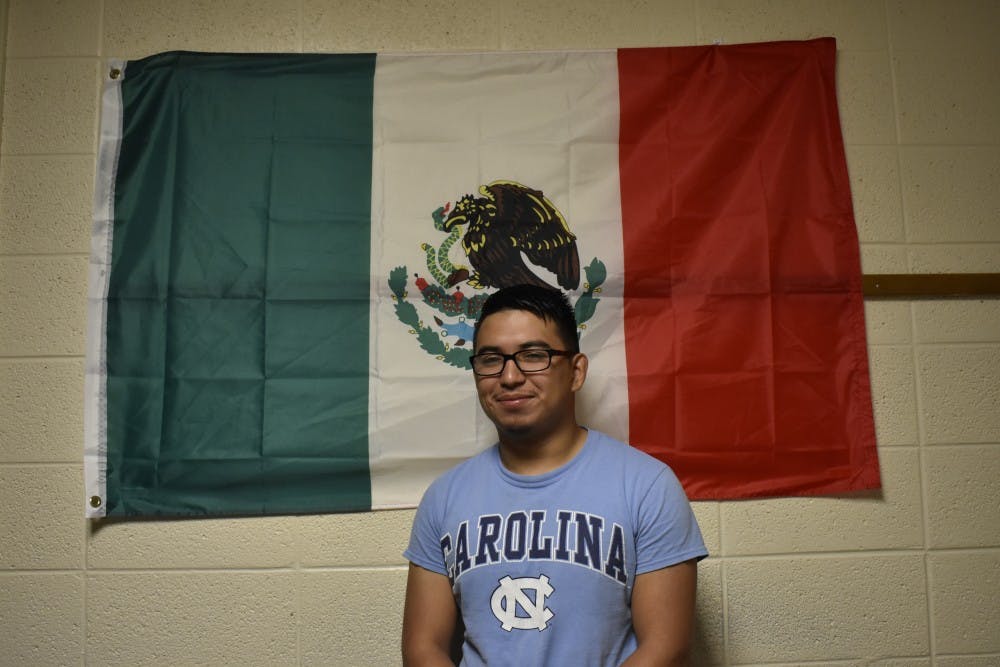She's deferred her acceptance into the UNC School of Social Work master's program to work for a company that helps students in low-resource areas and schools.
After DACA's termination, UNC faculty members and fellow students offered support, Maria said. But official resources from the University, like supportive teams and seminars, came later.
Maria also became involved with the N.C. Dream Coalition, a group formed in response to the end of DACA.
She worked alongside fellow DREAMers, like 24-year-old Marco Antonio Cervantes Garcia.
Cervantes recalls when he and his family first learned about DACA 6 years ago.
“We were all really ecstatic about it," he said. "When they started announcing all the requirements, we were already starting to make checklists of the things we already had and needed."
Cervantes was born in Mexico and brought to the U.S. soon after his first birthday.
"North Carolina, specifically Chapel Hill, is all I know," said Cervantes, who studies civil engineering at Durham Technical Community College.
Cervantes aims to become a civil engineer, with a focus on working with water systems. He hopes to help places like his hometown in Mexico, where the tap water is contaminated with saltwater.
Over the last year, Cervantes, Maria and other N.C. Dream Coalition members took lobbying trips to Washington, D.C., asking legislators to find a permanent, positive solution for DACA recipients.
“A lot of people think that because you're undocumented you can't stand up for yourself, you can’t do anything to improve your situation," Cervantes said. "But just being there with people that had a similar goal was pretty inspiring and encouraging."
Maria said juggling activism and school posed a big challenge.
To get the day's news and headlines in your inbox each morning, sign up for our email newsletters.
“It was just the most difficult semester I've ever had at UNC by far,” she said. “Trying to balance going to D.C. four to six times a month, sometimes just for a day to lobby all day, with school and work and still trying to (finish) my senior year, trying to apply for graduate school — it was just a lot.”
The fate of DACA is a constant stressor for all DREAMers, Maria said.
“For DREAMers, this decision happened, and then every single day after that you're still thinking about when your DACA expires,” she said. “I always say it's like you’re living on an expiration date.”
When the program was rescinded, recipients whose permits expired before March had a month to renew. But since February, several federal courts ruled to block DACA's termination, ordering the United States Citizens Immigration Services to continue accepting renewals.
The agency hasn't accepted new DACA applications since October.
A federal judge in Texas ruled in favor of DACA on Friday, despite stating the program was an executive overreach. The court declined to issue an injunction against DACA, after eight states sued the federal government, claiming the program was unconstitutional.
Although DREAMers can renew their permits, not all of them are taking the opportunity to do so.
According to an analysis by the Center for American Progress, only a small percentage of DACA recipients up for renewal in November and December 2018 have applied for it as of July 31.
“If USCIS were to stop accepting renewal applications, approximately 452,700 DACA recipients would lose protection in the next calendar year, not considering any filed in August,” the analysis said.
According to Joaquín Alfredo-Angel Rubalcaba, an assistant professor in the UNC Department of Public Policy, the decline may be a result of the fear and uncertainty caused by the Trump administration.
Rubalcaba said that not only do applicants worry that their permits could be revoked, but that their families could be put at risk.
DREAMers have to give up a lot of information, such as where they live, if they are working or going to school, background checks and biometric screenings. Providing all this information to the government could jeopardize the safety of their families, he said.
The application process for DACA was a huge burden, he said.
Even at the outset of DACA in 2012, a lot more people qualified for the program than those who actually applied. It’s estimated those who originally joined the DACA program were roughly half the of 1.3 million who met DACA criteria.
Maria said she understands this fear personally.
“I was actually pretty late to the game in applying for DACA,” Maria said. “I didn't trust the program, and there wasn't really anyone that I trusted that was knowledgeable enough about it that made me comfortable in applying to it.”
The program also poses a financial burden — DREAMers have to pay a filing fee of $465 every two years to renew their permits.
Gomez Olvera said he tries to be optimistic, but events like the ICE raids across the state last spring put him on guard.
“I had a family friend whose dad got taken away by ICE while on his way to work, so it's things like that that scare me,” he said. “I try not to think about it, I try to focus on my studies, but it's hard when those things are happening.”
In spite of the uncertainty surrounding DACA, Olvera said he's focused on finding a stable career.
He has never met his extended family, only seeing them through photos, Facebook and phone or video calls, but Olvera said he still hopes to benefit them with his future as well.
“Honestly, the big overall goal is to provide for my family,” he said. “As long as I'm able to support my family back in Mexico and also my immediate family here, then I'm set. That's my big, overall dream.”
@emilykdavis1
state@dailytarheel.com




